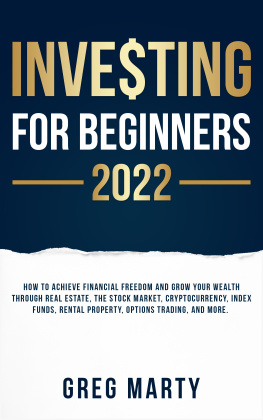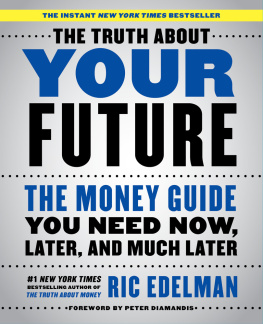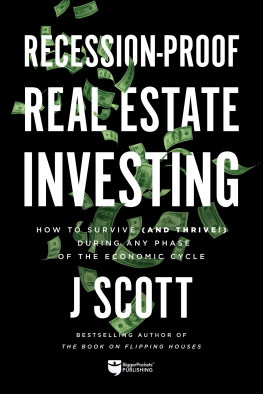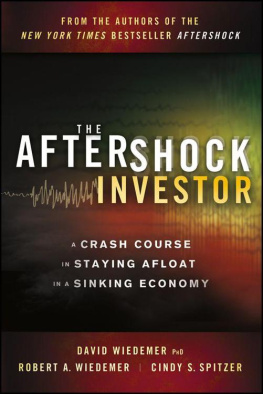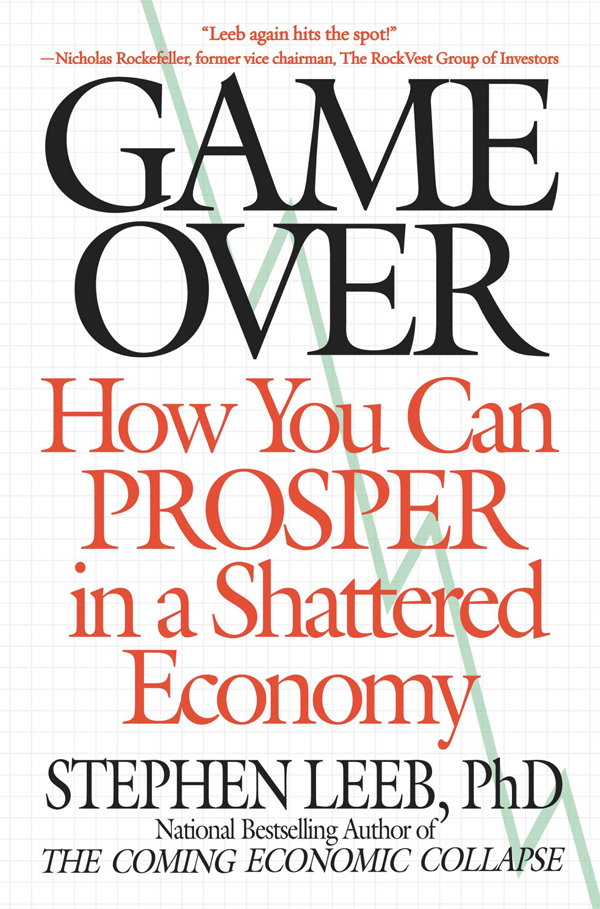This publication is designed to provide competent and reliable information regarding the subject matter covered. However, it is sold with the understanding that the author and publisher are not engaged in rendering legal, financial, or other professional advice. Laws and practices often vary from state to state and if legal or other expert assistance is required, the services of a professional should be sought. The author and publisher specifically disclaim any liability that is incurred from the use or application of the contents of this book.
Copyright 2009 by Stephen Leeb
All rights reserved. Except as permitted under the U.S. Copyright Act of 1976, no part of this publication may be reproduced, distributed, or transmitted in any form or by any means, or stored in a database or retrieval system, without the prior written permission of the publisher.
Business Plus
Hachette Book Group
237 Park Avenue
New York, NY 10017
Visit our Web site at www.HachetteBookGroup.com.
Business Plus is an imprint of Grand Central Publishing.
The Business Plus name and logo are trademarks of Hachette Book Group, Inc.
First eBook Edition: January 2009
ISBN: 978-0-446-55736-8
Getting in on the Ground Floor: How to Make Money Now And from Now On In the New Bull Market
by Stephen Leeb and Donna Leeb
Market Timing for the Nineties: The Five Key Signals for When to Buy, Hold, and Sell
by Stephen Leeb and Roger S. Conrad
The Agile Investor: Profiting from the End of Buy and Hold
by Stephen Leeb and Roger Conrad
Defying the Market: Profiting in the Turbulent Post-Technology Market Boom
by Stephen Leeb and Donna Leeb
The Oil Factor: Protect Yourself and Profit from the Coming Energy Crisis
by Stephen Leeb and Donna Leeb
The Coming Economic Collapse: How You Can Thrive When Oil Costs $200 a Barrel
by Stephen Leeb and Glen Strathy
To Tim
May all your dreams come true
Talk about timing. As this book left our hands to enter production, the United States was embarking upon a financial meltdown that in a matter of days has irrevocably altered Wall Streets landscape. The near failure and last-minute rescue of Bear Stearns; the virtual nationalization of Fannie Mae and Freddie Mac; the demise of Lehman Brothers; the near failure and rescue of AIG; the $750 billion federal bailout of the financial industry, the massive drop in both stocks and commodities, and more these are all extraordinary events whose full repercussions have yet to unfold. And we have no doubt that further changes lie ahead.
Against this rapidly evolving backdrop, is our book still relevant to investors? Could any investment book be relevant?
You bet. Heres why wed change barely a word of what follows, other than, if we could, reference recent events as further evidence for many of our key arguments relating to the turbulent outlook for the economy and investors that we have projected.
First, while at the moment the turmoil among financial institutions is on center stage, the underlying realities that impelled us to write this book in the first place remain as true, as urgent to confront, and as pertinent to investors as ever and, dangerously, they are being ignored. The vicious circles we describe that link oil and other commodities wont disappear. The need to develop alternative energies on a large-scale before it becomes impossible to do so remains utterly pressing. Civilizations very survival remains at stake, and it would be tragic if the dramatic events in the financial arena distract us any further from tackling these basic and critical issues.
Second, a chief implication of these underlying realities the prospects for ongoing economic turbulence that ultimately will skew ever more toward rising and ultrahigh inflation holds even truer now than previously as financial institutions founder and the government is taking on massive new obligations. For investors, it has become more important than ever to understand the nature of the economic tsunami we face.
In particular, its essential to realize that the sharp fall in commodities is a temporary reprieve that is sowing the seeds of its own demise. The reason is that when commodity prices drop, critical new projects get shut down because prices arent high enough to make them profitable. Eventually, however, demand for commodities is certain to rise as the unprecedented injections of money into the economy bring growth backto a world where commodities are in even shorter supply than they would have been had prices not dropped. The result will be a rapid and steep rebound in prices.
In other words, the recent extraordinary events demonstrate, as we explain in the following pages, that the world is ineluctably trapped between flirtations with deflation and ever higher inflation.
Third, against this background, the investments we urge you to buy are even more essential than just a few weeks back. And the risks of investing unwisely have become concomitantly greater.
Fourth, the current meltdown has had the effect of making some of our predictions for instance, our conviction that Wall Streets heyday was destined to fade come to pass sooner rather than later. The implications we trace, including our projections of which occupations will move to the fore in coming years as investment banking and the legal profession dim, remain right on track.
In sum, we think our book is more relevant than ever. But dont take our word for it. Read it and, we hope, benefit from it. These are truly perilous times for investors, and the more you understand the underlying nature of the threats we face, the more likely that you will be among the relatively few who can survive in good shape.
W e want to start out by simply listing three facts that, taken as a whole, should scare all of us silly or, more positively, prod us to action.
Fact 1: Globally, capitalism is out of the bag. Growing numbers of the worlds 6.6 billion people are now actively seeking to equal Americans high-consumption lifestyle that defines success in terms of how much one can afford to buy.
Fact 2: On average in China and India there are 25 vehicles per 1,000 inhabitants. This compares with around 140 per 1,000 in Brazil and with more than 800 per 1,000 in the United States.
Fact 3: Iran, another developing country that operates under a version of capitalism, is currently experiencing economic growth of 6 percent a year. At that rate, by 2013 this oil-exporting nation will become a net importer of oil.
Think through the implications of these three realities and youll start to understand why the world is headed for a train wreck centered on pending massive shortages of commodities and why its so urgent to act now before it truly is too late.
The United States has long been living under seven comforting but false assumptions that are about to be exploded. In fact, the alarm clocks already have started to sound.
These assumptions are:
1.The world contains virtually limitless oil and mineral deposits. If supplies get too tight, we can always find more.
2.Governments and central banks know how to keep inflation under control.
3.Economic growth, perhaps with some occasional small interruptions, is on a perpetual upward track that will bring ever greater prosperity to all the worlds inhabitants.
4.Americas wealth is based on enduring advantages including free enterprise and Yankee ingenuity that will ensure we will always have the top spot in the global pecking order.
5.The national debt is no problem because economic growth will be so strong that we can pay it off... someday.



